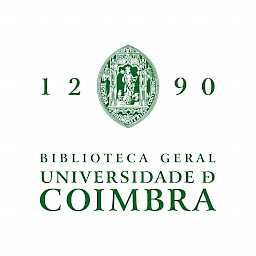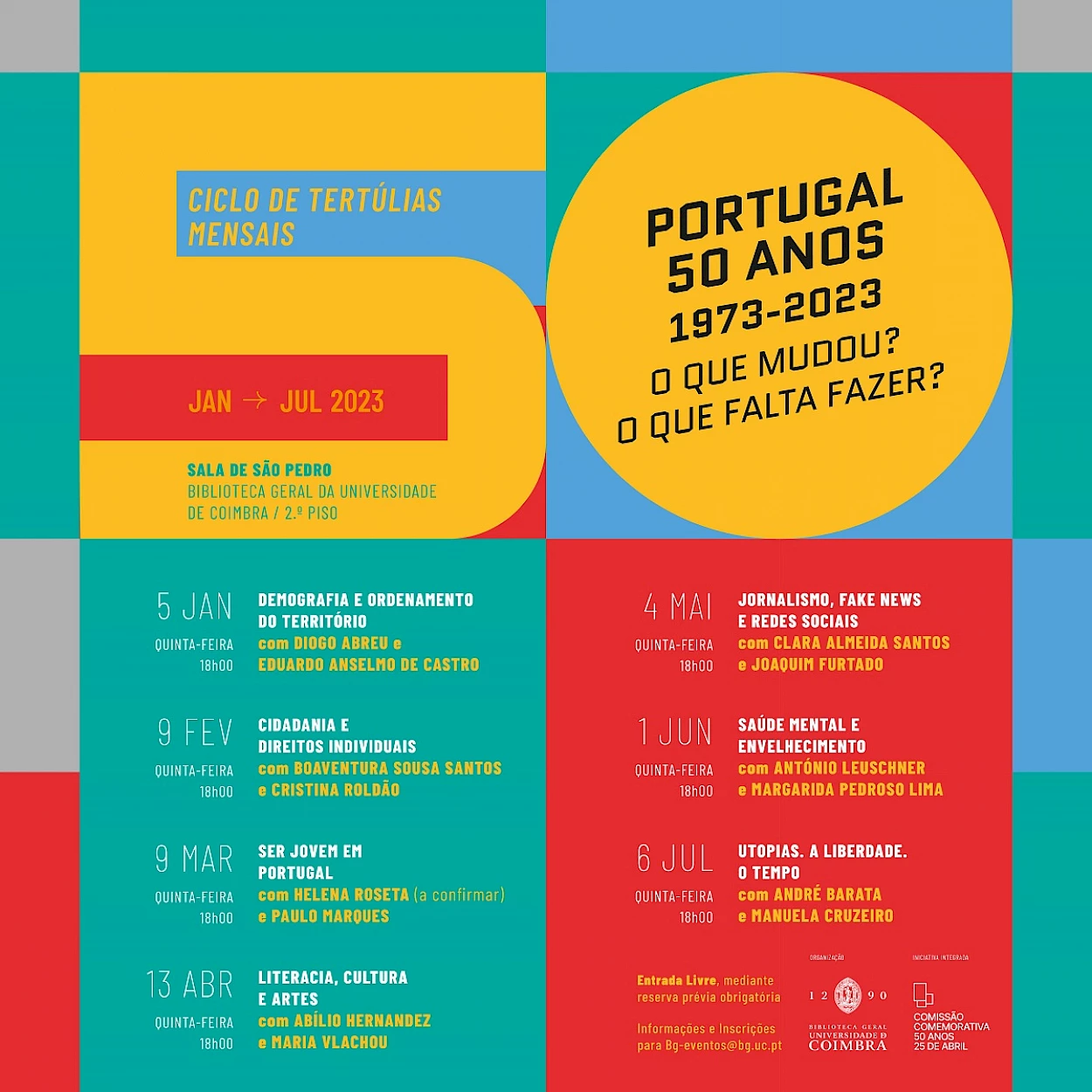A series of round tables dedicated to observing the main transformations that have occurred in Portugal over the last five decades in various areas. The project proved Fernando Pessoa right: «God wills, man dreams, the work is born» – between January and July, the beautiful Sala de São Pedro hosted seven public sessions, with the aim of celebrating – in a fraternal atmosphere and highly informative discussion – the 50th anniversary of the 25th of April. In each of the sessions there was a specific topic and, in most cases, two guests from different generations: one with lived experience of the revolution, the other born after 1974. The sessions were always sold out months in advance, and, therefore, BGUC provided its transmission via Facebook. The merit of this event series was recognized by its inclusion in the General Programme for the 25th of April Celebrations, which began in March 2022.
Demography and Spatial Planning
with Diogo Brochado de Abreu and Eduardo Anselmo de Castro
5 January 2023
In the case of the round table on «Demography and Spatial Planning», there were five issues that stood out: the worrying decrease in the birth rate and the figures on the aging of the Portuguese population; recent immigration trends and their articulation with the responses to the dilemmas resulting from the previous point; the need for advance and rigorous planning of major national options, at all levels (education, health, housing, etc.); the importance of training for qualified jobs that guarantee foreign investment with a good return for Portugal; and the desertification of the interior of the country (a topic explored, above all, in the debate). Impressive in this session was the amount of relevant and very clear statistical information about the problems analyzed, and the ability to place its analysis within a very broad international horizon.
Citizenship and Individual Rights
with Boaventura de Sousa Santos and Cristina Roldão
9 February 2023
In the session on “Citizenship and Individual Rights” the following aspects were highlighted: the contrast between the progress recorded throughout the history of Europe, on the one hand, and in other regions of the world (such as America or Africa), on the other hand; the current status of issues related to equality (namely gender or race); the evolution of trade union struggles, today more defensive, as a result of the global evolution of the capitalist mode of production; the (im)possible coexistence between capitalism and democracy; and the technological challenges of the future, in particular those posed by Artificial Intelligence. The recording of this session includes only one of the presentations, which is complemented by a summary text on the evolution of the concept of “citizenship” from Ancient Greece to the Portuguese liberal revolution, and its consequences.
Being Young in Portugal
with Helena Roseta and Paulo Marques
9 March 2023
The round table on «Being Young in Portugal» had a well-defined purpose: to discuss two core problems – access to housing; and job insecurity. These themes were analyzed from a broad historical perspective about the changes recorded at this level over the last fifty years and about the current situation and even evoking European models, with regard to the construction of a development model that makes it possible to reconcile a regulatory strategy with the change in the specialization profile of the Portuguese economy (something that would be very important to improve access to employment for our young people). By happy coincidence, this gathering coincided with the public discussion, by the Government, of a package of measures on housing in Portugal.
Literacy, Culture and the Arts
with Abílio Hernandez and Maria Vlachou
13 April 2023
The debate on «Literacy, Culture and the Arts» took us through the fascinating territories of literacy (in a country that, at the beginning of the 1970s, had 26% of people who could not read or write), the cultural policy of the Estado Novo, compulsory education, the democratization of access to Higher Education, the type of education we provide (infrastructure, 'student formating'), the crucial importance of the arts as a unique space for freedom and creation; but also the social relevance of culture, cultural policies (national and local), associations, training of agents and audiences, criteria for evaluating the success of initiatives, forms of publicizing events, creativity (not just 'fruition', but also 'creation'), the cultural habits of the Portuguese and the urgency of more inclusive cultural practices, among other topics.
Journalism, Fake News and Social Media
with Clara Almeida Santos and Joaquim Furtado
4 May 4 2023
In the session on «Journalism, Fake News and Social Media», our guests covered topics such as: the close relationship between Journalism and Democracy; the search for truth, the need to be ‘suspicious’ before reporting, the identification of sources; the constraints, before the 25th of April, on independent and non-superficial journalism; the impact of technological innovations on the dizzying transformation of social communication; the concepts of fake news and “post-truth”; the various types of “information disorders”; the social impact of the news; the problem of social media and digital media (with impressive numbers of video downloads on YouTube, photographs on Instagram and posts on Facebook); the importance of online sources in Portugal; the standardization of information content; and how to deal with Artificial Intelligence (manipulating) algorithms.
Mental Health and Aging
with António Leuschner and Margarida Pedroso de Lima
1 June 2023
The event on «Mental Health and Aging» clearly highlighted the connection between the two themes. There was talk of the “stigma” associated with mental illness and the very concept of “elderly”; of what “mental health” really is and the international policies of recent decades towards its active promotion; the risks of loneliness and the relationship between mental suffering and poverty; the role of literacy and proximity in promoting mental well-being; the challenge of accurately identifying the cause of a mental illness; and the relevance of integrated health policies, especially for the elderly. At the same time, average life expectancy figures were recalled and the social challenges this entails were analyzed; the concept of “old age” was called into question and it was remembered that aging is a natural phenomenon that begins with our birth, hence the need to adopt good practices from childhood, in line with what is recommended by the WHO (cf. “Decade of Healthy Aging”, 2021-2030).
Utopias: Freedom. Time.
with André Barata and Manuela Cruzeiro
6 July 2023
The closing round table, on «Utopias: Freedom. Time”, led us to the concepts of “revolution”, “memory” and “utopia”. It led us to think about “time” and the use we make of it in the “hypermodernity” in which we live. Together, we thought about how to counteract the accelerated pace of our lives, which prevents us from living fully. There was also talk about the recreation of “habitable” places, capable of ingraining “habits”, and the socio-political implications this has, in terms of policies to promote professional stability and housing that prevent us from deserting our own country. The etymology of “place” led us, finally, to revisit the idea of “utopia” (the “non-place”) and the importance it has in the reconstruction of our daily lives: utopia as an ideal that guides our action, which makes us never stop walking towards a better country and world, in which we feel … “the joy of being part”.


